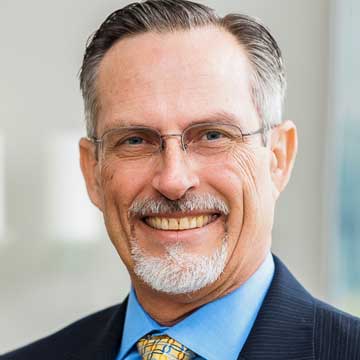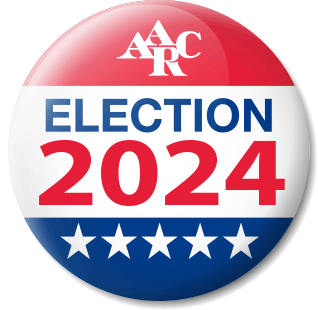President-Elect
John Wilgis
Vice President, Member and Business Relations
Florida Hospital Association
Member Since: 1999
AARC Activities:
- Parliamentarian, 2020
- Director-At-Large, 2017-2020
- Ad Hoc Committee on Advanced RT Practices, Credentialing and Education Committee Co-Chair, 2019-2020
- Ad Hoc Committee on State Initiatives Committee Co-Chair, 2015-2016
- Ventilator Capability & Capacity Sub-Committee Chair, 2007-2009
House of Delegates Activities:
- House of Delegates, Immediate Past Speaker, 2016
- Speaker, 2015
- Speaker-Elect, 2014
- Policies Manual and Delegate Guide Revisions Committee Chair, 2012-2014
- Resolutions Committee Member, 2011-2013
- Florida Society for Respiratory Care Junior Delegate, 2011-2013
- Ad Hoc Committee for Policies and Procedures/Delegate Handbook Revisions Chair, 2011-2012
Affiliate Activities:
- Affiliate Activities
- Life Member, 2014
- Junior Delegate, 2013-2014
- Past President, 2012
- President, 2011
- President-Elect, 2010
- Past – President 2009-2010
- President, 2008-2009
- President-Elect, 2007-2008
- Hospital Surge Capability Team Ventilator Sub-Committee Chair, 2004-2009
- Internal Audit Committee Chair, 2007-2008
- Legislative Committee Co-Chair, 2007-2013
- Parliamentarian, 2005-2007
- River City Symposium Planning Committee Co-Chair, 2006
- River City Symposium Planning Committee Member, 1999-2006
- American Association for Respiratory Care, Political Action Contact Team (PACT), Florida Society for Respiratory Care Coordinator, 2002 – 2005
- Chapter 5 Director, 2001-2004
- Chapter 5 Associate Director, 1999-2001
Related Organizations:
- American Society for Healthcare Engineering Member, 2012 – Current
- American Society for Healthcare Resource and Materials Management Member, 2016 – Current.
Education:
- RRT, Flagler Career Institute, Jacksonville, FL, 1989
- Bachelor of Science – Health Care Services, University of Phoenix, Jacksonville, FL, 2005
- Masters in Business Administration – Health Care Management, University of Phoenix, Jacksonville, FL, 2007.
Publications:
- Strickland, S., Varekojis, S., Goodfellow, L., Wilgis, J., Hayashi, S., Nolan, L., and Burton, G. (November 2020). Physician Support for Non-Physician Advanced Practice Providers for Persons with Cardiopulmonary Disease. Respiratory Care. 65:11, 1702-1711.
- Dichter, J.R., Kanter, R.K., Dries, D., Luyckx, V., Lim, M.L., Wilgis, J., Anderson, M.R., Sarani, B., Hupert, N., Mutter, R., Devereaux, A.V., Christian, M.D., Kissoon, N. on behalf of the Task Force for Mass Critical Care. (2014). System-Level Planning, Coordination, and Communication – Care of the Critically Ill and Injured During Pandemics and Disasters: CHEST Consensus Statement. CHEST 2014; 146 ( 4_Suppl ): e87S – e102S.
- McDonough, M., Wilgis, J. (January 2010). Mechanical Ventilator Surge Capacity – Stockpile Logistics. AARC Times. 34:1, 16-18.
- Wilgis, J. (June 3 2008). Florida Hospital Association Helps with the Emergency Coordination of Resources. South Florida Hospital News. 4:12, 36.
- Wilgis J. (April 2008). How to be Prepared for a Pandemic. AARC Times. 32:4, 28-32
- American Association for Respiratory Care. (April 2008). On The Cover: John Wilgis Takes on Disaster Planning in Florida. AARC Times. 32:4, 6-10. Interview article.
- American Association for Respiratory Care. (2008). Professor’s Rounds 2008 Series: An Update of Mass Casualty Ventilation Guidelines and Standards. 1 CRCE DVD Presentation.
- Wilgis J. (January 2008). Strategies for Providing Mechanical Ventilation in a Mass Casualty Incident: Distribution Versus Stockpiling. Respiratory Care. 53:1, 96-103.
- Wilgis, J. (April 2007). The Challenge of Transport and Ventilator Management in Biohazard Situations. AARC Times. 31:4, 34-37.
- American Association for Respiratory Care. (September 2005). Preparing for the Worst: FSRC Plays Integral Role in State Emergency Preparedness Efforts. AARC Times. 29:9, 84-85. Interview article.
Elections Committee Questions:
What do you see as the biggest challenge facing the profession of respiratory care, and what do you recommend the ARC do to address it?
It’s hard to identify a single challenge to address when there are so many things driving health care today. The biggest challenge we, as Respiratory Therapists and members of the AARC face is focusing our work on the needed growth of the profession and our membership enabling the AARC to continue to serve as a relevant and representative voice of the profession and its members. I believe we need to continuously communicate who we are, what we do, and how we add value to the care of the patients we serve, across the continuum and at every level. I have always advocated for the Association, its affiliates, and members to continue the hard work of advancing our profession to meet the health care needs of our patients in a dynamic and disruptive industry that continues to evolve and change. But the AARC can’t represent us unless we represent it! Together, we need to engage with the AARC as representatives compelled to lead us into future.
Healthcare is changing more rapidly than ever. What ideas do you have to help today’s respiratory therapist meet these changes?
We should actively embrace change while ensuring our place in new care delivery models and modalities. Technology is driving the changes in health care. It’s more than the sophistication of tomorrow’s mechanical ventilators and therapies. Data aggregation, artificial intelligence and machine learning, genetic testing and treatment, and other technologies are driving clinical practice in an effort to improve efficiencies and patient outcomes. Hospitals and health systems are consolidating services as they move to become health care corporations. I believe we should be actively engaged in the changes occurring. We can learn and use these technologies and modalities to augment the high level of care we provide while promoting and advocating the value of our profession. If we do nothing, we risk being left behind. Today’s Respiratory Therapist should be actively engaged in the changes occurring in the workplace. Let’s highlight the best practices that demonstrate our value and potential.
Role-Specific Questions:
Two of our greatest ongoing concerns are promoting the profession and increasing membership. What are your solutions to address these needs?
I would like to find more ways to publicly promote the profession that informs who we are, what we do, and how we make a difference to the patients we serve. These campaigns and programs help attract people to the profession and members to the AARC. I would like to explore how we can use data to inform our decisions and augment communications about our profession. We need to continue to move towards RRT as the entry level to practice in every state, and towards Bachelors and Advanced Practice degrees. We need to continue to improve our communications about how we are advocating for the average therapists and their concerns. It takes all of us working with the AARC to be the change agent that promotes, advocates, communicates, and advances Respiratory Care.







